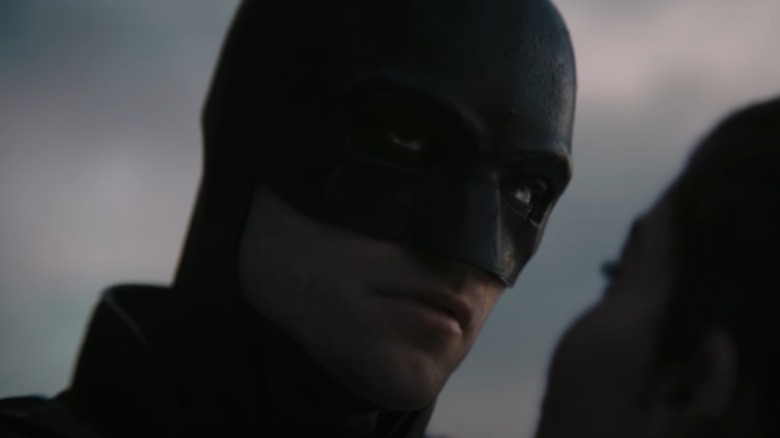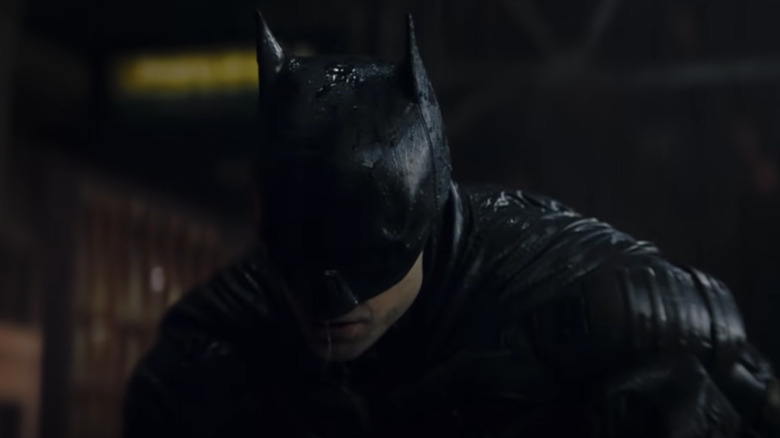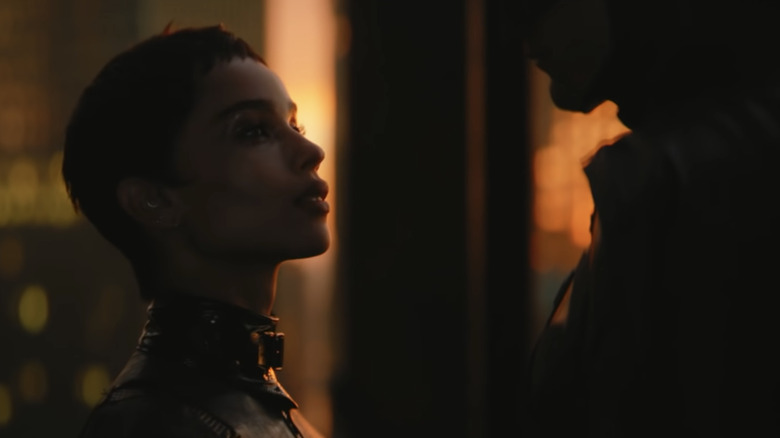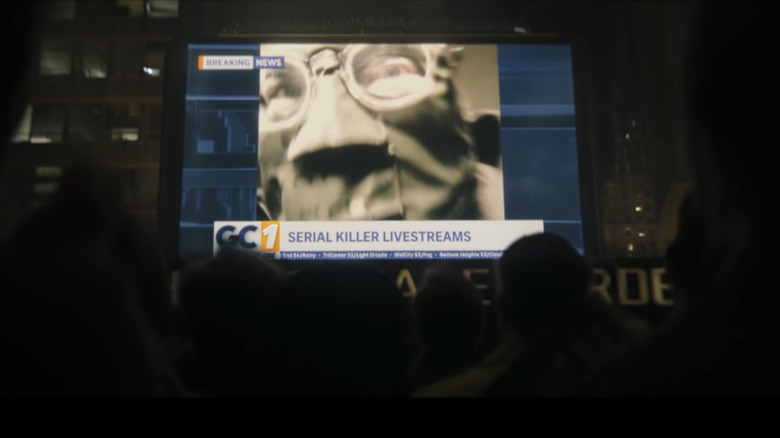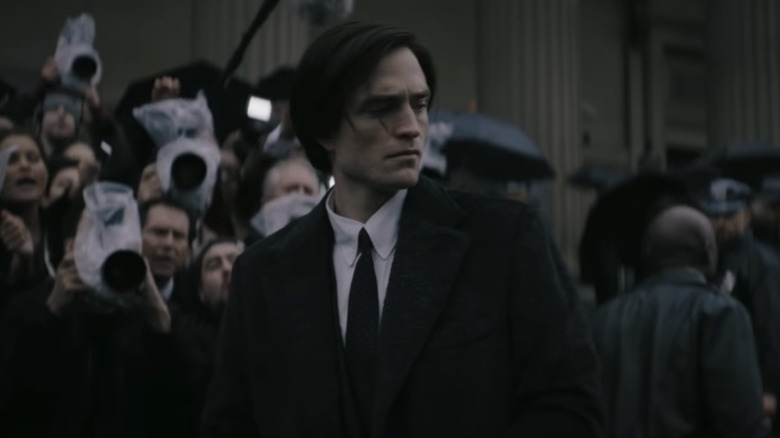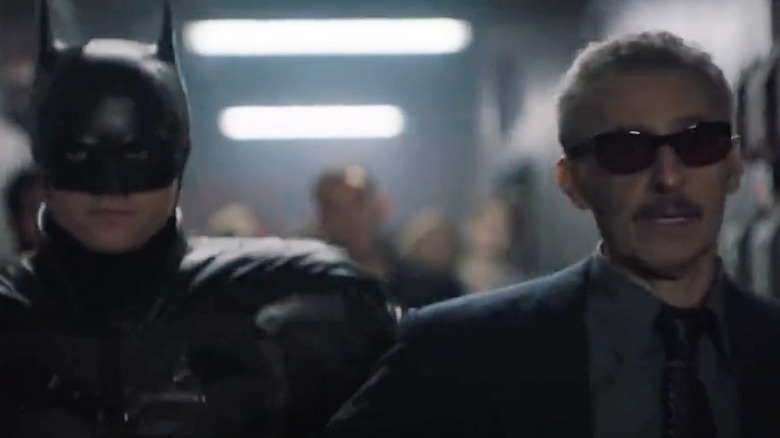Lines In The Batman That Are More Important Than You Think
In some ways, Robert Pattinson's Batman feels like a throwback to how earlier generations viewed masculinity. He speaks softly, if at all, and seems to prefer letting his fists do the talking. When a beat cop or thug confronts him, his stare says speaks volumes.
In other ways, Pattinson's Batman feels like a very modern take on masculinity. His brooding voiceovers are tinged with moral conflict, self-loathing, feelings of futility and irrelevance. When people around him are struck down, he sheds tears. At times, he seems to suffer from a depression that both Batman and Bruce Wayne make little effort to conceal.
Although words are sometimes as hard to come by in "The Batman" as sunny days in Gotham, the overall effect is that when Batman and many of his supporting denizens do choose to speak, their dialogue carries great weight. With the exception, perhaps, of Colin Farrell's Penguin, who seems to never shut up.
With all this in mind, here's a breakdown of several key lines in Matt Reeves' "The Batman." Some may appear to mean one thing, but actually have deeper intentions; others may signify a tonal shift for a classic DC character; still more are simply too cool to ignore. Whatever the reason, read on to find out why these spoiler-heavy moments of exposition are worth your undivided attention.
'I'm vengeance'
Those two words, spotlighted in the trailer, had already become something of a viral sensation on social media before the film was released. If this movie has a "You wanna get nuts? C'mon, let's get nuts!" moment, this is it. But what's interesting is that if you search the hashtag in real life, many people have embraced it in a way that pokes fun at Batman's constant brooding and self-seriousness. This largely mirrors what happens in the film.
Although Batman doesn't say the line in the presence of any of the film's main characters, that doesn't stop Catwoman (Zoe Kravitz) from teasing him about it. A few others do as well, treating his declaration like an embarrassing Rage Against the Machine lyric he once scribbled in their yearbook.
"Come on, Vengeance," Selina Kyle teases him at one point.
Obviously, certain elements are intrinsic in the Batman character. His parents were murdered, and he has since spent his days and nights training and planning to become the ultimate crime deterrent. A big part of his power is the fear he instills in Gotham's criminals ("Fear is a tool" RBattz says at one point in voiceover), so if there's anyone outside the WWE who could credibly utter a line like "I'm vengeance" with complete sincerity, it would be The Batman.
But at the same time, Pattinson's Batman (similar to Christian Bale's Batman in the early moments of "The Dark Knight") is just beginning to come to grips with the cause-and-effect his presence has created in Gotham. The crime is relentless, the villains are increasingly more dynamic, and his nightly efforts don't seem to be making much of a dent. Overall, there's a sense of near-mockery throughout "The Batman" with characters like Riddler (Paul Dano), Penguin, and Carmine Falcone (John Turturro) treating their adversary's sincerity as if it's a shortcoming. They say vengeance is a dish best served cold — and that's exactly the reception Batman's criminals seem to give his declaration of war.
'I have a thing about strays'
This line is spoken by Selina Kyle (Kravitz) in response to Batman's observation that "you've got a lot of cats." It also sums up this take on the character; nearly every action we see from this Catwoman is motivated by the welfare or memory of someone else. She embraces the causes and furthers the efforts of the vulnerable, just as you'd take in a stray cat and give it the love it needs to grow.
Most overtly, she is on a mission to save her friend who has gone missing. But like Batman, she always has the memory of her murdered mother coloring her actions. Then, of course, there's Batman himself — another stray that Selina often pushes, cheers up, and looks after.
Take a look at the scene where Selina agrees to wear a wire (okay, special Batman contact lenses that broadcast a signal) to work at the 44 Below club hidden within Penguin's Iceberg Lounge. Clearly, she hates being an informant for Batman. But she's willing to risk her life to help out the Bat — and hopefully get some information on the missing girl's whereabouts.
In some ways, this take on Catwoman might be the most purely "good' one fans have seen in a film. Sure, she technically retains the skills of a cat burglar, but she uses them to get back stolen passports rather than steal family jewels. Arguably, she's every bit the "hero" that Batman is — and unless you're willing to bring up Halle Berry's Catwoman (please, let's not), this Kravitz take on the character is the kindest Catwoman we've seen.
'Say hello to my followers!'
The line is sure to get a giggle from viewers — and c'mon, isn't that what the Riddler is all about? But keep in mind, moviegoers haven't seen a cinematic take on this character since Jim Carrey in 1995's "Batman Forever." Which, in essence, means this is the first mainstream depiction of the character since the modern internet became a thing.
More than anyone else in Batman's rogues gallery, the man typically known as Edward Nygma seems made for these times. The reality of the 2020s is filled with mind games (Wordle, anyone?), manipulated messages of dubious creation (deepfakes), anonymous ne'er-do-wells and other touchstones the Riddler once manipulated with a pen and piece of paper (or occasionally, skywriting). This is the perfect opportunity to update the character into something more threatening and less cartoonish, and "The Batman" leans into that.
"Say hello to my followers; we're live!" he says at one point, kicking off a livestream with the intention of holding the District Attorney (Peter Sarsgaard) accountable for his perceived shortcomings. "They're here to watch our little trial."
The Riddler's creepy new mask, off-kilter glasses and affection for duct tape result in a threatening new look that no green leotard could approach. His grainy hostage videos and mocking riddles go together like milk and cookies, adorned by user comments in the corners of the frame. Riddler uses the tools of social media to create a formidable army who copy him in appearance and technique, a metaphor in some ways for the difficulties of modern international conflict. No longer do our enemies stand on a battlefield wearing a clearly-identifiable uniform; now, anonymity and the camouflage of the commonplace act to confuse those who would hope to defend us.
While the Nolan movies and the Snyderverse both used modern tech to depict threats to Batman, neither of them thought to do so via the Riddler. Now, the character has been reimagined as a Jigsaw-like manipulator for the 21st century, and the potential for further development of this incarnation — and his "followers" — seems rife with potential.
'That means he took the Hippocratic Oath'
This line comes at a key point in the film, as Bruce Wayne/Batman continues to cling to any loose string he can find of his core principles, even as a city under siege and a rising pile of bodies around him serve as nagging indications he may be fighting a losing battle. Carmine Falcone (an excellent John Turturro), one of the most despicable puppeteers in Gotham, solicits the response when he approaches Wayne and tries to bond with him.
"Your father saved my life," says the gangster, explaining that surgeon/CEO Thomas Wayne once tended to him. "You think that doesn't mean something?"
Dismissing the moment as inconsequential, Bruce Wayne tells Falcone his father did it out of obligation, not friendship. "That means he took the Hippocratic Oath," he says.
What you're witnessing here is the final moments of Bruce Wayne's child-like sheltered view of the way the world works. In almost every incarnation of Batman, Thomas and Martha Wayne are hugely powerful, hugely beloved characters senselessly gunned down. They are perfect martyrs for Batman to avenge. But not in "The Batman."
Instead, further revelations are to come about how Thomas and Martha rose to power, silenced their critics, and hid their secrets. In short, Thomas was far from a noble doctor who treated everyone equally. As the line becomes blurred between Carmine Falcone and Thomas Wayne, it eats away at the very foundation of the Batman mission. Could it be that Thomas Wayne wouldn't simply help someone out of professionalism and duty? Could it be that Falcone was ... a friend?
'You made me do this. Just like your mother.'
For all his fancy talk and Machiavellian mind-games, Falcone is just another homicidal thug. This becomes evident in the final scenes involving the character, as he is confronted by Selina and their struggle leads to him nearly strangling her.
Both Bruce Wayne and Selina Kyle have significant backstories involving dead parents and their involvements with this film's gangster. Falcone, however, is a relatively recent creation in the Batman universe (he made his debut in a 1987 comic, and has been portrayed in live-action by the likes of Tom Wilkinson and John Doman) — and although his criminal activity has often been a driving force behind Gotham's sorry state, this is perhaps the most influential we've ever seen the character. In essence, without Falcone, there likely wouldn't be a Batman or a Catwoman.
But during a far more primal moment, the line is shouted out as he's attempting to expel the last remnants of air from Selina's body. This confession that he did, in fact, kill Maria Kyle should bring closure for Selena on some level; not that she's able to appreciate it, until Falcone is finally knocked off her and arrested.
Where does Selena go from here? Like several of the other main characters in "The Batman," she is essentially a grown orphan, grappling with demons and ghosts she cannot ignore. The last time we see Selena, her storyline is resolved, she has no one left to be with (Bruce Wayne is "spoken for" by Gotham, as she so eloquently puts it), and she's heading off on her motorcycle to start a new life. Now, it seems, she's the stray.
